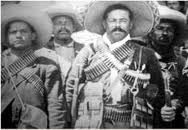The Storm That Swept Mexico
Premieres Sunday, May 15 at 10pm
By Julio Martinez
 Much of what United States citizenry know of Mexico has been shaped by Hollywood films and much hyped immigration concerns, leaving us with a vague prejudice that our neighbor to the south is just not as politically, economically or sociologically advanced as us. Actually, compared to many countries in Europe, Asia and Africa, the U.S. is a veritable toddler and Mexico is even younger. Though Mexico declared independence from Spain in 1810, it did not win its complete freedom to establish a republic until 1824. And it did not operate under a Constitution until 1917, 130 years after the efforts of the US Constitutional Convention.
Much of what United States citizenry know of Mexico has been shaped by Hollywood films and much hyped immigration concerns, leaving us with a vague prejudice that our neighbor to the south is just not as politically, economically or sociologically advanced as us. Actually, compared to many countries in Europe, Asia and Africa, the U.S. is a veritable toddler and Mexico is even younger. Though Mexico declared independence from Spain in 1810, it did not win its complete freedom to establish a republic until 1824. And it did not operate under a Constitution until 1917, 130 years after the efforts of the US Constitutional Convention.
Mexico’s growing pains as a sovereign nation are impressively documented .
In the two-hour PBS special, The Storm That Swept Mexico, airing Sunday, May 15 at 10pm (check local listings), narrated by actor and playwright Luis Valdez, directed by Raymond Telles, written and produced by Telles and Archivist Kenn Rabin. Though sketchy references are made to Mexico’s history under Spain, its 19th century battles for independence and the brief puppet monarchy of Maximilian I (1864-67), Telles’s principal focus is the monumental Mexican Revolution of 1910 and its reverberation throughout the 20th century.
Utilizing a plethora of archival still images and film footage, the first hour, titled The Tiger is Unleashed, chronicles the efforts of idealistic but politically naïve revolutionary Francisco I. Madero to overthrow the militaristic dictatorship of Porfirio Diaz, who had ruled the country for 35 years (1876-1911). As a charismatic figure, Madero is dominated by two disparate personalities: the cerebral, understated Emiliano Zapata, who led the Liberation Army of the South, demanding land reform; and the effusive, publicity-hungry Francisco “Pancho” Villa, an acknowledged bandit and train robber, who rose to be commander of the Division of the North.
The documentary also underscores the relentless involvement and interference by the U.S. government and European countries, especially Germany that would try to enlist Mexico as a World War I ally. The Mexican Revolution proves to be a forerunner to the encroaching modernization of society around the world, the first wave of political and social upheavals that would soon sweep across Russia, Iran, China, parts of the Third World and eventually Germany.
The second hour, The Legacy, makes great use of color photography and cinema to explore Mexico’s evolving sense of political and cultural nationalism, solidified by the presidency of Lázaro Cárdenas, who served as president from 1934 to 1940, but continued to influence Mexico’s political affairs for many years after. During this period, Mexican artists, such as Diego Rivera, Jose Orozco, David Siqueiros, Frida Kahlo and others burst onto the international stage and Mexico City became the nexus of an indigenous and muralist art movement.
The documentary also underscores the fragility of Mexico’s political and social stability during the latter part of the 20th century, highlighted by the 1968 student revolt that swept Mexico City just days before the scheduled Mexico City-hosted Olympics. Garnering support from disaffected workers, the students’ battle cry was “We don’t want Olympics, we want a revolution.”
Telles stops short of delving deeply into current concerns about immigration, US/Mexico relations and the country’s place within the world’s community of nations, but does offer a concise, emotionally invigorating history lesson of a nation relentlessly striving to move forward. Ten years in the making, the documentary is enlivened by the commentary of a wide range of scholars, as well as several veterans of the 1910 Revolution who were each over 100 years old at the time of filming.
The Storm that Swept Mexico is co-production of Paradigm Productions, Inc. and the Independent Television Services (ITVS) in association with Latino Public Broadcasting (LPB). Major funding was provided by the National Endowment for the Humanities, with additional funding from the Corporation for Public Broadcasting, and The San Francisco Foundation.


 Arturo Castañares
Arturo Castañares



